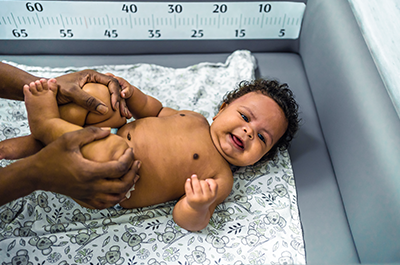Back-to-school season can be exciting—it’s a fresh start and a new routine—but it can also be stressful and nerve-wracking. “Even if kids are going to a school they’ve attended since kindergarten, it’s still new—a new teacher, a new classroom, new classmates,” says Kelly Melistas, a child and adolescent psychologist at Henry Ford Health. “And this year, specifically, is the first year a lot of kids are going back to school in person since the pandemic, so we’re seeing a lot of anxiety around that. I tell people it’s like riding a bike—it takes a second to get on and get your balance.”
Kids respond to what they see, which is why it’s important for parents to be cognizant of their behavior. “Anxious parents send anxious kids to school,” she adds. So while the return to school can be stressful, there are ways to make the transition as seamless as possible.
Here, Melistas offers seven tips.
1. Make going back to school fun. If your kids haven’t started school yet, take them ahead of time to peak in through the windows or play on the playground. “Some teachers let their students come a week early to see the classroom,” says Melistas. “It can help alleviate worries and get them excited about school.” And don’t underestimate the power of school-supply shopping. “For my daughter, there’s nothing better,” she says. “Getting her pencils and markers, picking out notebooks—for kids, the little things make a difference.”
2. Check in with your kids daily. “In my family, every evening we take turns talking about the worst part of our day, the best part of our day, and what we’re looking forward to tomorrow,” says Melistas. “Was the worst part of their day something they also mentioned twice last week? It allows you to keep your finger on the pulse of what’s going on in their lives. And then thinking about what they’re looking forward to shows them there’s always an opportunity to make tomorrow better. It can really be a fun and engaging activity.”
3. Establish daytime and nighttime routines. Before going to bed, have your kids lay out their clothes and pack their backpack. It helps reduce anxiety, since they won’t have to worry about it the next day. In the morning, have them get dressed right after waking up—the longer they stay in their pajamas, the less likely they’ll be enthused about getting ready. “I also recommend no devices in the morning,” Melistas says. “It gives your brain a chance to wake up and prepare for the day.”
4. Make sure your kids get enough sleep. “Maintaining a consistent sleep-wake cycle is really important,” says Melistas. Kids ages 3 – 5 need anywhere between 10 and 13 hours a night. Kids ages 6 – 13 need 9 to 11 hours a night, and teens ages 14 – 17 need around 8 – 10 hours of sleep. “Lack of sleep is directly correlated with anxiety, irritability and inability to focus,” she says. “In fact, some states have pushed back the start time for high school students because sleep is so important.”
5. If you can, make an extra effort to be present during the back-to-school transition. “Creating fun experiences for your kids—like getting ice cream after school or heading to the park—can help ease the transition,” says Melistas. Just because school is in session doesn’t mean all of the summer fun has to end, especially when the weather is still nice.
6. Listen to your children—but know you don’t always have to “fix” their problems. “As parents, a lot of the time we want to immediately offer our kids a bag of 20 solutions to any given problem,” says Melistas. “But it’s important to really understand what they’re saying and follow their lead to know when to offer suggestions, when it’s something they just want to vent about or when they don’t want to talk about it. That’s okay too. They’ll come around.”
7. Be particularly sensitive to nerves around school safety. Sadly, the threat of school violence is a source of stress and anxiety. But having a routine they can rely on can help. “Kids are creatures of habit,” says Melistas. “They are resilient but they thrive on routine. School-age kids feel safe when they know what to expect. Even if there are wrenches thrown their way, they can fall back on the reliability and comfort of that routine.” It’s also important to have honest, age-appropriate conversations with your children—and watch for any changes in their behavior. Are they sleeping more than usual? Are they not sleeping enough? Are they not interested in activities they used to be interested in? Are they isolating? If so, talk to your child. If needed, a therapist’s intervention can help.
To find a pediatrician or behavioral health therapist at Henry Ford, visit henryford.com or call 1-800-436-7936.
Kelly Melistas is a child and adolescent psychologist who sees patients through Henry Ford Health’s Pediatric Behavioral Health Integrated Care program.



